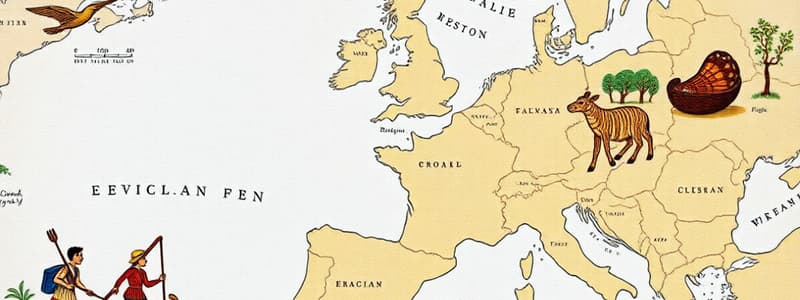Podcast
Questions and Answers
What was a significant outcome of the Agricultural Revolution?
What was a significant outcome of the Agricultural Revolution?
- Introduction of mechanized farming tools
- Decline in population growth
- Improved farming methods and efficiency (correct)
- Increased reliance on hunting for food
What was the main purpose of joint stock companies?
What was the main purpose of joint stock companies?
- To create monopolies in trade
- To allow people to invest and share profits (correct)
- To promote agricultural development
- To fund government projects exclusively
Which of the following best describes mercantilism?
Which of the following best describes mercantilism?
- Equal import and export of goods
- Exporting more goods than importing (correct)
- Trade without tariffs or regulations
- Government control of all economic activity
What was the significance of the Mayflower Compact?
What was the significance of the Mayflower Compact?
What factor contributed to the growth of the Atlantic Slave Trade?
What factor contributed to the growth of the Atlantic Slave Trade?
What was a primary purpose of the Age of Exploration?
What was a primary purpose of the Age of Exploration?
What was a consequence of the Columbian Exchange?
What was a consequence of the Columbian Exchange?
What characterized royal colonies?
What characterized royal colonies?
What was the significance of the 3/5ths Compromise?
What was the significance of the 3/5ths Compromise?
Which document marked the American colonies' declaration of independence from Britain?
Which document marked the American colonies' declaration of independence from Britain?
What was a result of Shays' Rebellion?
What was a result of Shays' Rebellion?
What did the Great Compromise establish regarding representation in Congress?
What did the Great Compromise establish regarding representation in Congress?
Which event is known for demonstrating the federal government's authority to enforce laws?
Which event is known for demonstrating the federal government's authority to enforce laws?
What did the Louisiana Purchase accomplish?
What did the Louisiana Purchase accomplish?
What was the purpose of the Monroe Doctrine?
What was the purpose of the Monroe Doctrine?
What did Judicial Review empower the Supreme Court to do?
What did Judicial Review empower the Supreme Court to do?
What was the purpose of the Missouri Compromise?
What was the purpose of the Missouri Compromise?
Which event led to increased tensions between the U.S. and Mexico?
Which event led to increased tensions between the U.S. and Mexico?
Which of the following best describes Manifest Destiny?
Which of the following best describes Manifest Destiny?
What was the outcome of the Goliad Massacre?
What was the outcome of the Goliad Massacre?
What did the Indian Removal Act of 1830 achieve?
What did the Indian Removal Act of 1830 achieve?
What was significant about the Treaty of Guadalupe Hidalgo?
What was significant about the Treaty of Guadalupe Hidalgo?
How did the Spoils System influence government employment under Andrew Jackson?
How did the Spoils System influence government employment under Andrew Jackson?
What was a significant outcome of the Protestant Reformation?
What was a significant outcome of the Protestant Reformation?
Which battle resulted in Santa Anna's defeat and forced him to sign a treaty?
Which battle resulted in Santa Anna's defeat and forced him to sign a treaty?
What event marked the overthrow of King William III and Queen Mary II?
What event marked the overthrow of King William III and Queen Mary II?
What did the Enlightenment emphasize regarding individual thought?
What did the Enlightenment emphasize regarding individual thought?
What was a direct consequence of the Proclamation of 1763 for the colonists?
What was a direct consequence of the Proclamation of 1763 for the colonists?
Which act required colonists to pay taxes on shipped goods, leading to significant protest?
Which act required colonists to pay taxes on shipped goods, leading to significant protest?
What event escalated tensions between Boston colonists and British soldiers, resulting in the death of five colonists?
What event escalated tensions between Boston colonists and British soldiers, resulting in the death of five colonists?
What action did American colonists take in defiance of British tax laws during the Boston Tea Party?
What action did American colonists take in defiance of British tax laws during the Boston Tea Party?
What was the significance of the Battle of Yorktown?
What was the significance of the Battle of Yorktown?
What was the primary goal of the Wilmot Proviso?
What was the primary goal of the Wilmot Proviso?
How did the Compromise of 1850 affect California's status?
How did the Compromise of 1850 affect California's status?
What was the impact of the Fugitive Slave Law on Northern society?
What was the impact of the Fugitive Slave Law on Northern society?
What major event did the Kansas-Nebraska Act lead to?
What major event did the Kansas-Nebraska Act lead to?
What was the main message of Uncle Tom's Cabin?
What was the main message of Uncle Tom's Cabin?
What led to the Dred Scott Decision's widespread anger in the North?
What led to the Dred Scott Decision's widespread anger in the North?
What was a direct consequence of Bleeding Kansas?
What was a direct consequence of Bleeding Kansas?
What was the significance of the Lincoln-Douglas Debates?
What was the significance of the Lincoln-Douglas Debates?
What was the primary effect of the 13th Amendment?
What was the primary effect of the 13th Amendment?
What did the 14th Amendment ensure for African-Americans?
What did the 14th Amendment ensure for African-Americans?
What was the main purpose of the 15th Amendment?
What was the main purpose of the 15th Amendment?
What was a primary characteristic of sharecropping after the Civil War?
What was a primary characteristic of sharecropping after the Civil War?
What were Black Codes primarily designed to do?
What were Black Codes primarily designed to do?
Which of the following was NOT an American disadvantage during the Revolutionary War?
Which of the following was NOT an American disadvantage during the Revolutionary War?
Which of the following was one of the British advantages in the Revolutionary War?
Which of the following was one of the British advantages in the Revolutionary War?
What was a factor that contributed to the weakness of the Articles of Confederation?
What was a factor that contributed to the weakness of the Articles of Confederation?
Flashcards
Agricultural Revolution
Agricultural Revolution
A period of great advancements in farming techniques, leading to improved efficiency and food production. It was a key factor in the growth of populations and the development of civilizations.
Columbian Exchange
Columbian Exchange
The exchange of plants, animals, diseases, and ideas between the Old World (Europe, Asia, and Africa) and the New World (the Americas) following Christopher Columbus's voyages.
Mercantilism
Mercantilism
A system where European countries sought to increase their wealth by exporting more goods than they imported. It encouraged the accumulation of gold and silver and the establishment of colonies to supply raw materials.
Joint Stock Companies
Joint Stock Companies
Signup and view all the flashcards
Mayflower Compact
Mayflower Compact
Signup and view all the flashcards
Royal Colonies
Royal Colonies
Signup and view all the flashcards
Indentured Servitude
Indentured Servitude
Signup and view all the flashcards
Atlantic Slave Trade
Atlantic Slave Trade
Signup and view all the flashcards
First Great Awakening
First Great Awakening
Signup and view all the flashcards
Stamp Act & Townshend Acts
Stamp Act & Townshend Acts
Signup and view all the flashcards
Boston Massacre
Boston Massacre
Signup and view all the flashcards
Boston Tea Party
Boston Tea Party
Signup and view all the flashcards
Coercive/Intolerable Acts
Coercive/Intolerable Acts
Signup and view all the flashcards
Lexington and Concord
Lexington and Concord
Signup and view all the flashcards
The Battle of Yorktown
The Battle of Yorktown
Signup and view all the flashcards
Proclamation of 1763
Proclamation of 1763
Signup and view all the flashcards
Declaration of Independence
Declaration of Independence
Signup and view all the flashcards
Articles of Confederation
Articles of Confederation
Signup and view all the flashcards
3/5ths Compromise
3/5ths Compromise
Signup and view all the flashcards
Great Compromise
Great Compromise
Signup and view all the flashcards
Revolution of 1800
Revolution of 1800
Signup and view all the flashcards
Judicial Review
Judicial Review
Signup and view all the flashcards
Whiskey Rebellion
Whiskey Rebellion
Signup and view all the flashcards
Triangular Trade
Triangular Trade
Signup and view all the flashcards
What is Manifest Destiny?
What is Manifest Destiny?
Signup and view all the flashcards
What is the Treaty of Guadalupe Hidalgo?
What is the Treaty of Guadalupe Hidalgo?
Signup and view all the flashcards
What is the Battle of the Alamo?
What is the Battle of the Alamo?
Signup and view all the flashcards
What is the Goliad Massacre?
What is the Goliad Massacre?
Signup and view all the flashcards
What is the Battle of San Jacinto?
What is the Battle of San Jacinto?
Signup and view all the flashcards
What is the Spoils System?
What is the Spoils System?
Signup and view all the flashcards
What is the Indian Removal Act of 1830?
What is the Indian Removal Act of 1830?
Signup and view all the flashcards
What is The Missouri Compromise?
What is The Missouri Compromise?
Signup and view all the flashcards
13th Amendment
13th Amendment
Signup and view all the flashcards
14th Amendment
14th Amendment
Signup and view all the flashcards
15th Amendment
15th Amendment
Signup and view all the flashcards
Ku Klux Klan
Ku Klux Klan
Signup and view all the flashcards
Sharecropping
Sharecropping
Signup and view all the flashcards
Black Codes
Black Codes
Signup and view all the flashcards
Wilmot Proviso
Wilmot Proviso
Signup and view all the flashcards
Popular Sovereignty
Popular Sovereignty
Signup and view all the flashcards
Compromise of 1850
Compromise of 1850
Signup and view all the flashcards
Fugitive Slave Law
Fugitive Slave Law
Signup and view all the flashcards
Underground Railroad
Underground Railroad
Signup and view all the flashcards
Uncle Tom's Cabin
Uncle Tom's Cabin
Signup and view all the flashcards
Kansas-Nebraska Act
Kansas-Nebraska Act
Signup and view all the flashcards
Bleeding Kansas
Bleeding Kansas
Signup and view all the flashcards
Study Notes
U.S. History Semester 1 Review
-
Agricultural Revolution: A period of time when farming methods improved, providing farmers with more efficient ways to farm and feed surrounding populations. This led to better tools and more crops being produced.
-
Age of Exploration: Inventions like the compass revolutionized exploration. People migrated to the Americas and began establishing colonies.
-
Atlantic Slave Trade: African people were forced to work as slaves in the U.S. This introduced the practice of slavery.
-
Joint Stock Companies: Companies sold shares to investors, allowing people to pool money and share profits. This practice gave opportunities to make money.
-
Mercantilism: Exporting more goods than importing created wealth and power. This system built a middle class.
-
Jamestown and Plymouth Colonies: Jamestown used tobacco for profit, while Plymouth was founded by pilgrims seeking freedom. A system of profit and the house of burgess developed in Jamestown.
-
Columbian Exchange: The exchange of diseases, plants, and animals between the Old and New Worlds following Columbus's voyages.
-
Mayflower Compact: A document signed by the pilgrims on the Mayflower, claiming territory for America and establishing the foundation for the United States.
-
Royal Colonies: Colonies directly ruled by a king or queen.
-
Religious Persecution: People were harmed for their religious beliefs
-
Indentured Servitude: People worked for a set period of time in exchange for passage or other benefits. This was an early form of labor.
-
Protestant Reformation: New religious denominations emerged, questioning practices of the Catholic Church.
-
Glorious Revolution: King William III and Queen Mary II were crowned.
-
Enlightenment: New ideas about government and society emphasizing reason and individual rights.
-
Proclamation of 1763: This prohibited colonists from settling west of the Appalachian Mountains, leading to conflict between colonists and the British government.
-
Stamp Act: A British tax on printed materials sparking protest from colonists.
-
Townshend Acts: British acts imposing taxes on various goods, further inflaming colonial resentment
-
Boston Massacre: A confrontation between colonists and British troops, resulting in the death of several colonists.
-
Gaspee Affair: Colonists attacked and burned a British ship, escalating tensions.
-
Boston Tea Party: As a protest against British taxation, colonists dumped tea into Boston Harbor.
-
Lexington and Concord: The first armed conflict of the Revolutionary War. Colonists defended themselves against the British attempt to seize weapons.
-
Battle of Yorktown: The final major battle of the Revolutionary War, ending in Britain's defeat.
-
Declaration of Independence: The official declaration of the American colonies' separation from Great Britain.
-
Articles of Confederation: The first government of the newly formed United States, but it was weak and ineffective. The Articles led to the establishment of a new form of government based on more established ideas.
-
3/5ths Compromise: A compromise that counted enslaved people as three-fifths of a person for the purposes of taxation and representation in Congress.
-
Great Compromise: This proposal favored larger states by representing them based on population, and favored smaller states by representing them with 2 senators in a state.
-
Revolution of 1800: Thomas Jefferson became president.
-
Judicial Review: The Supreme Court's power to review laws to decide constitutionality.
-
Bacon's Rebellion: A rebellion led by Nathaniel Bacon against the government, particularly regarding Native American policy.
-
Shays' Rebellion: Farmers protested against high taxes and economic hardship; a major indication of the weakness of the Articles of Confederation.
-
Whiskey Rebellion: Farmers rebelled against a tax on whiskey; an indication of the new federal government's increasing power.
-
Triangular Trade: A system of trade between Europe, Africa and America.
-
Louisiana Purchase: A vast area of land west of the Mississippi River was purchased from France by the United States.
-
Monroe Doctrine: The policy that the U.S. would not tolerate future European colonization in the Americas.
-
Missouri Compromise: A compromise regarding slavery, to balance representation between free and slave states.
-
Indian Removal Act of 1830: Caused the forced relocation of Native American tribes from their ancestral lands.
-
Second Great Awakening: Religious revivalism in the US.
-
Manifest Destiny: The belief that the U.S. was destined to expand across North America.
-
Texas: Texas gained independence from Mexico.
-
Battle of the Alamo: A critical battle in Texas's fight for independence from Mexico.
-
Goliad Massacre: A significant loss for the Texan army and further motivated Texans to gain independence.
-
Mexican-American War: Conflict over Texas's annexation and territorial disputes resulted in territorial gains for the US.
-
Treaty of Guadalupe Hidalgo: Agreement ending the Mexican-American war, granting more territory to the United States.
-
Wilmot Proviso: Proposed that any territory acquired from Mexico would ban slavery, as the US attempted to manage the conflict caused by the annexation.
-
Popular Sovereignty: The idea that citizens in each territory should decide for themselves whether or not to allow slavery.
-
Compromise of 1850: This legislation addressed the issue of slavery in newly acquired territories.
-
Fugitive Slave Law: Required the return of runaway slaves. This law angered abolitionists in the North.
-
Underground Railroad: Secret routes used to help enslaved people escape to freedom.
-
Uncle Tom's Cabin: Book detailing the hardships of slavery and contributing to the abolitionist movement.
-
Kansas-Nebraska Act: Opened the territories of Kansas and Nebraska to settlement. This led to "Bleeding Kansas," violence over the issue of slavery.
-
Dred Scott Decision: A Supreme Court ruling that declared enslaved people were not citizens and could not sue for their freedom. This further inflamed tensions.
-
Lincoln-Douglas Debates: A series of debates between Abraham Lincoln and Stephen Douglas that focused largely on the issue of slavery.
-
Secession: Several Southern states seceded from the Union, leading to the formation of the Confederate States of America. This ultimately led to the Civil War.
-
Northern Blockade: The Union Navy's blockade of Southern ports.
-
Battle of Fort Sumter: The battle that initiated the Civil War.
-
Emancipation Proclamation: Lincoln's declaration that freed enslaved people in Confederate territory.
-
Battle of Antietam: The bloodiest single-day battle of the Civil War.
-
Battle of Gettysburg: A Union victory, turning point of the Civil War.
-
Reconstruction Amendments (13th, 14th, and 15th): The 13th abolished slavery, the 14th granted citizenship and equal protection, and the 15th guaranteed the right to vote for male citizens.
-
KKK: A terrorist organization that used violence to intimidate African Americans and prevent them from exercising their newly formed rights. This was a significant part of the Reconstruction era.
-
Share Cropping: Agricultural system similar to slavery, although not technically slavery, that re-established racial inequality.
-
Black Codes: Laws passed after the Civil War that restricted the rights of African Americans; aimed to re-establish the system of racial inequality
-
Short Answer: Review of fundamental principles of the Revolutionary Era (such as the ideals of liberty and the right to self-determination), and the writings of Thomas Paine.
-
British Advantages & Disadvantages: British military and economic strengths versus the American Colonists' knowledge of the terrain and motivation to fight.
-
American Advantages & Disadvantages: American Colonists' strength and motivation to fight for independence versus the weaknesses of their military and political systems.
-
Articles of Confederation Weakness: Critically examine the reasons for the Articles of Confederation's weaknesses and why they were ultimately insufficient in form to establish effective governance.
-
Missouri and Compromise of 1850: Comprehending the core principles and implications of each compromise, in relation to its role in causing conflict.
-
Road to Revolution: Summarize the key events and issues that led to the Revolutionary War.
-
Great Compromise: Understand how the Great Compromise settled disputes on representation in the newly formed government.
Studying That Suits You
Use AI to generate personalized quizzes and flashcards to suit your learning preferences.




